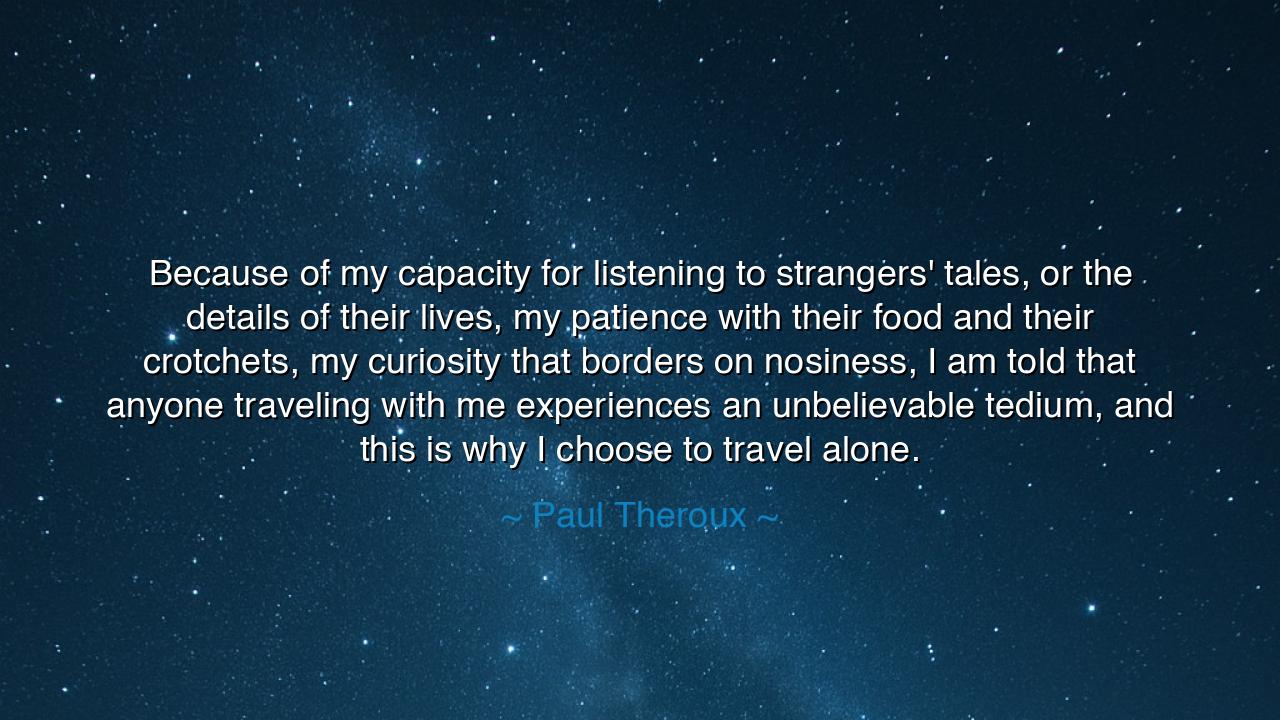
Because of my capacity for listening to strangers' tales, or the
Because of my capacity for listening to strangers' tales, or the details of their lives, my patience with their food and their crotchets, my curiosity that borders on nosiness, I am told that anyone traveling with me experiences an unbelievable tedium, and this is why I choose to travel alone.






In the words of Paul Theroux, the great traveler and chronicler of the world, we are given not just a confession, but a philosophy of solitude: “Because of my capacity for listening to strangers' tales, or the details of their lives, my patience with their food and their crotchets, my curiosity that borders on nosiness, I am told that anyone traveling with me experiences an unbelievable tedium, and this is why I choose to travel alone.” At first glance, these words may seem like the quiet admission of a man who prefers solitude. Yet beneath them lies the essence of a wanderer’s wisdom: that the soul of travel is not speed or comfort, but immersion in the stories and lives of others.
Theroux’s patience is not an idle thing; it is the patience of one who knows that every meal shared, every strange custom observed, every tale listened to with care, is a doorway into understanding. Where others rush to destinations, he lingers in the details. Where others grow restless with what they call “tedium,” he finds meaning, connection, and humanity. His “curiosity that borders on nosiness” is in truth the driving fire of the traveler’s art: the hunger to know, to enter into another’s world, to step beyond one’s own narrow boundaries.
But such a pace does not suit companions. Many wish to move quickly, to see the mountains and monuments without pausing at the kitchens and hearths of strangers. To them, Theroux’s way of travel is tiresome, too slow, too absorbed in the invisible details of ordinary people. And so he is told that he is tedious. Yet instead of bending his path to the will of others, he chooses to walk alone, so that he might continue to listen, to linger, to learn. This is the solitude of purpose, chosen not from bitterness, but from fidelity to the deeper calling of his journeys.
History too offers such figures. Consider Herodotus, called the father of history, who wandered through Egypt, Persia, and Greece, gathering not only the deeds of kings but the tales of commoners. His curiosity, no doubt, seemed excessive to some, but through his endless listening and note-taking, he preserved the spirit of entire civilizations. Or think of Marco Polo, whose accounts of the East were filled with the details of strange foods, customs, and lives. These men too might have been judged tedious by impatient companions, but their slowness gave birth to wisdom that endured for centuries.
The meaning of Theroux’s words, then, is this: true travel is not about conquest of distance, but surrender to encounter. It requires patience to endure long stories, strange meals, and odd habits; it requires humility to admit that strangers, however obscure, carry worlds within them worth hearing. To travel in this way is not glamorous; it is demanding, repetitive, and often lonely. Yet it is the path that transforms the traveler, carving wisdom into the soul.
And so, the lesson for us is clear: whether we journey through countries or through the lives of those around us, we must cultivate patience and curiosity. We must be willing to endure what others call tedious in order to glimpse the truth hidden beneath the surface. We must be unafraid to walk alone if our way of seeing the world is deeper, slower, and more faithful than the rush of the crowd. For in solitude, the traveler finds freedom—the freedom to listen, to learn, and to live fully in the moment.
So let Paul Theroux’s words be remembered as both a defense of solitude and a hymn to curiosity. Seek not only the grand landscapes, but the humble voices; linger where others hurry; listen where others speak. And if your way of seeing is judged dull or slow, then walk your path alone with pride. For in this patience and in this curiosity lies the heart of true travel: not the journey across land, but the journey into the soul of humanity itself.






AAdministratorAdministrator
Welcome, honored guests. Please leave a comment, we will respond soon